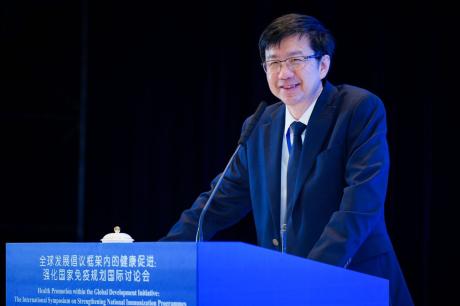
(l to r) Dechen Lama, Chandra Swanson and Roxana Martinez discuss their project, Think Straight, with a poster session attendee
Published April 28, 2015 under Education News
The global health capstone course encourages graduating global health majors to present real-world global health solutions by using the skills they’ve learned in their previous coursework. The course aims to give students experience working in a multi-disciplinary context, interacting with global health actors and ultimately devising a strategy to address a global health disparity they’re passionate about.
On April 20, the students in this year’s capstone course presented posters on their projects and explained their processes and results to event attendees. Six teams of seniors shared solutions ranging from using telemedicine to improve diabetes management in North Carolina to addressing maternal depression in northeastern Afghanistan.
Students Given Flexibility to Choose Topics
The variety of projects reflects the leeway students were given in completing the semester-long project. Teams were given a hypothetical $300,000 budget and were free to address whatever global health disparity interested them.
This year’s projects included:
- Dialing Into Diabetes: Using Telemedicine to Improve Diabetes Management in Rural North Carolina
- Addressing Maternal Depression in Northeastern Afghanistan: A Packaged Intervention to Improve the Health of Mothers and Infants
- NC Farmworker Access to Health Information
- Chocolate Milk Café: Improving Breastfeeding Outcomes among Low-Income African American Women in the Piedmont Region of North Carolina
- Hepatitis C in Egypt: Developing Patient- and Community-based Education Programs
- Think Straight: Using Theatre to Promote Gender Expression and Sexual Identity Dialogue among Youth
Nicole Savage, a student on the Dialing into Diabetes team, said having so much freedom made it difficult to know where to start but helped her think through the process of finding a solution. She said most of her team’s time was spent talking to NGOs, doctors and other global health actors before beginning to formulate a solution.
“You don’t want to go into a community and start making a lot of changes,” Savage said. “In the global health program, we’ve learned that you first need to understand everything about that community and you have to talk to a lot of people. Then you can start assessing their needs and brainstorming solutions.”
Course Is a Culmination of their Global Health Skills and Knowledge
The capstone course is structured so that students discuss their interests and form teams at the beginning of the semester, then take a few weeks to decide on a project and contact experts and global health actors, and then use the rest of the semester to flesh out the project.
DGHI professors David Boyd and Dennis Clements each led a capstone course, providing guidance and suggestions for the teams. The students used skills they learned in Fundamentals of Global Health, Research Methods, Global Health Ethics and other classes in compiling their research, results, and solution.
Presentations Allow Students to Showcase their Work
The final presentation was a chance for students to reflect on everything they had learned and share their results.
“It’s crucial that students learn to speak about global health and be able to express their ideas clearly and succinctly,” Boyd said. “We consider the formal presentation to be an integral part of the course.”
At the poster presentation, Clements and Boyd both praised the students for their excellent work. The posters will be on display at the global health commencement.


